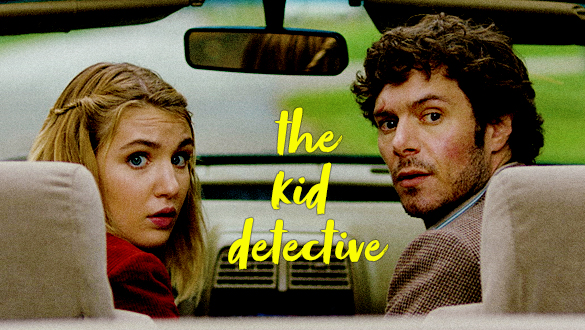There’s a moment that comes in the final act of “The Kid Detective” that made me yearn for movie theatres more than anything I’ve seen at TIFF this year. Evan Morgan’s film, one of the films participating in the TIFF Industry Selection programme this year, starts off as a droll and arch comedy that’s gently ribbing its protagonist – Abe Applebaum. Abe is a 32-year-old former child-prodigy; his days of prodigiously solving crimes as a teen has soured and he remains arrested in childhood regrets in his thirties. When an unwitting teenager “hires” Abe to solve her boyfriend’s murder, he is given a chance to prove himself – if he can only get out of his own way.
For much of the first half an hour, Morgan’s film (he writes and directs) ambles along keeping the seriousness, understatedly at bay, as we watch Abe stumble through the case. As the case intensifies, so do the stakes, and a scene near the end sharply changes the context of the film in a way that manages to be both jarring and rewarding. Less than a twist, the film’s final act turns on itself in a way that felt immediately satisfying. I wished I was watching this in a theatre to experience the moment. But even viewed in isolation, in TIFF’s virtual 2020 festival, “The Kid Detective” is a thrill.
Detective stories are a familiar genre on film, marked with its own familiar tropes. So, rather than presenting the case as a simple story of developing plots, Morgan’s focus – even more than the case – is the psychological assessment of Abe. There’s an impressive trick the film plays on us, and it’s more than a third into the film’s 90-minute running time that we realise that “The Kid Detective” is deconstructing itself, and its protagonist, in real time. The film’s opening sequence plays out like a sequence from a nineties children’s movie as we watch young Abe precociously solving case after case. When we meet adult Abe a few minutes later, a note-perfect Adam Brody who seems simultaneously world-weary and painfully young, the chasm between the bright-eyed young boy and this jaded man is stark. Abe’s downfall began when his childhood friend was abducted. For all his genius as a child, Abe could not find her.
Morgan devotes only brief moments to filling in the two decades between then and now, but we can intuit that life has not been kind to Abe. He continues his detective work, devoting his time to cases like a missing cat, a butcher’s sexuality and s childhood squabble. The townspeople watch him with averted eyes. His parents do little to mask their concern, and disappointment. There’s almost a noirish quality to the down-on-his-look detective whose story can change with the arrival of a new case. And a new case does pop up, although it’s not in the guise of a femme fatale. Instead, Sophie Nélisse arrives as the earnest teen looking for answers about her dead boyfriend. And at first, despite the death looming over everything, Morgan keeps things more humorous than not. Almost as if the film is only casually concerned with the murder of a teenager. The deconstruction, though, comes in consistent increments.
As the narrative builds, Abe’s detecting – moving between moments of sharpness and incompetence – keys us into the state of a man whose ambivalence about life seems chronic. Adam Brody’s work as Abe is a gift to Morgan’s precise detached comedy. Michael Robert McLaughlin’s camera gives us shot after shot of Brody’s face in close-up, building up a collage of detached expressions that become instructive. Brody manifests an air of detached sadness that reveals itself as indicative of something more than just casual dejectedness. By the time the film meets its halfway mark, we realise how Morgan’s slippery tone is mimicking the same emotional fluidity of its protagonist. It’s an ambitious strategy in a film that moves from scenes of farcical comedy to ones of exhausting unease, sometimes within seconds. But rather than representing any kind of narrative carelessness, we realise – on the back of Brody’s performance which is matching each shift in genre – that Morgan is deconstructing Abe as well as the film itself. That “The Kid Detective” manages to lull us into the warm beats of its early comforting, unsettling us in small increments until it pulls the rug out from under us are signs of its own sharp awareness of the tropes that it uses, and then subverts.
The film ends on a shot of Adam Brody’s face that lingers in my mind, days after I’ve seen it, presenting “The Kid’s Detective” as the most welcome surprise of the festival for me thus far. It’s a tricky year for cinema, and the oddness of discovering new films in isolation seems unusual. In an ideal world, “The Kid Detective” would have audiences enthralled by its peculiar, but rewarding, delights. Hopefully it finds success after its TIFF run. It’s a modest, but rewarding, triumph. It starts out as a joke that we feel like we’re in on, only to make us realise that a laughter is the best disguise for pain.





